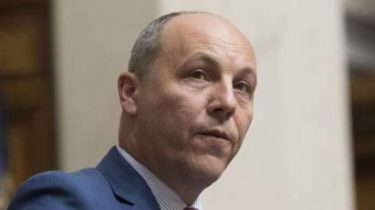Parliament may vote for an anti-corruption court until may – Parubiy

The law on the anti-corruption court, which must release the allocation to Ukraine of the IMF and other creditors will appear until may. This forecast was made by the speaker Andriy Parubiy during the meeting with experts of the International monetary Fund, says the story TSN journalist Maria Vasilyeva.
In Kiev this week a technical mission of the IMF. It examines whether the merits of the Ukrainian government and the trust in the form of the next tranche, without which Ukraine will be in a very difficult financial situation.
Delicate negotiations about money and broken Ukrainian government promises happen without prying eyes. However, they are easy to simulate. Well, something like this:
The IMF said: friends, do normal bill about anti-corruption court and you will be a tranche. You do the same in next year’s elections. And without financial injections will be the national currency and the economy hard, hard. There may even be a default. Then who will vote for you?
And they answered: look how good bill, here is the word “corruption court” and is a great building with a beautiful sign, what more do you want? As judges we are assigned – a very, very independent, you’ll see.
However, to deceive the venerable financial institution of the imitation of anti-corruption efforts now is not easy. The IMF learned one thing: the chairs in the morning, that is reform, then the money.
The presidential bill on the corruption court, the creditors rejected. They say he’s written so cleverly that the anti-corruption court will govern themselves corrupt. Today the speaker Andriy Parubiy promises to the envoys of the IMF: remarks into account, the law’s rewrite.
“I hope and believe that we can all the recommendations be implemented in consideration between the first and second reading of the law. And I hope that the month of may we will be able to complete the review and adopt the bill in the second reading”, – said during the meeting Parubiy.
The last time Ukraine received a tranche from the IMF last year, in April. And from that time – more than a penny. Of the 17.5 billion dollars Ukraine has received only half. And the second half will see at best a small part. New loans the state needs to pay off old debts. The peak of the payments in the next year. When the current program of cooperation with IMF is completed.
“The challenge is not just to get a breather, and to take steps that allow in the future to refuse IMF loans. Moreover, and so we are waiting for the completion of the program. As I recall, in March of the following year, the software stops their lives,” says the member of the Verkhovna Rada Committee on budget Viktor Pynzenyk.
While in relations with the IMF pause, frozen and assistance from the EU more than two billion dollars, and foreign markets no one is borrowing, and investors are cautiously waiting for better times.
“In Washington say IMF – the keys to the gate. No IMF, no international financial institution that works in the country. If there is no program of cooperation with the IMF and we don’t get half a billion, a billion, in order to send a signal to the world financial space is that the situation we are in relative control area,” said Executive Director of the International Fund blazer Oleg Ustenko.
Another fundamental requirement of the IMF is a big privatization. Not even for the sake of filling the budget, and to deprive the top corrupt officials of the feeders to which they have transformed state-owned enterprises. In power pondered a difficult choice. Because you can, of course, to slam the door to the IMF. But the price of such decision will inevitably be in a strong financial crisis before elections.
We will remind, the head of SAP Nazar Golodnitsky sure this year anti-corruption court in Ukraine does not work.
Following publication
Saw a bug — Ctrl+Enter
Letter in edition
© On materials
Dnia
Leave your comment
Leave your comment
All comments
Always
deployed
Editor’s choice